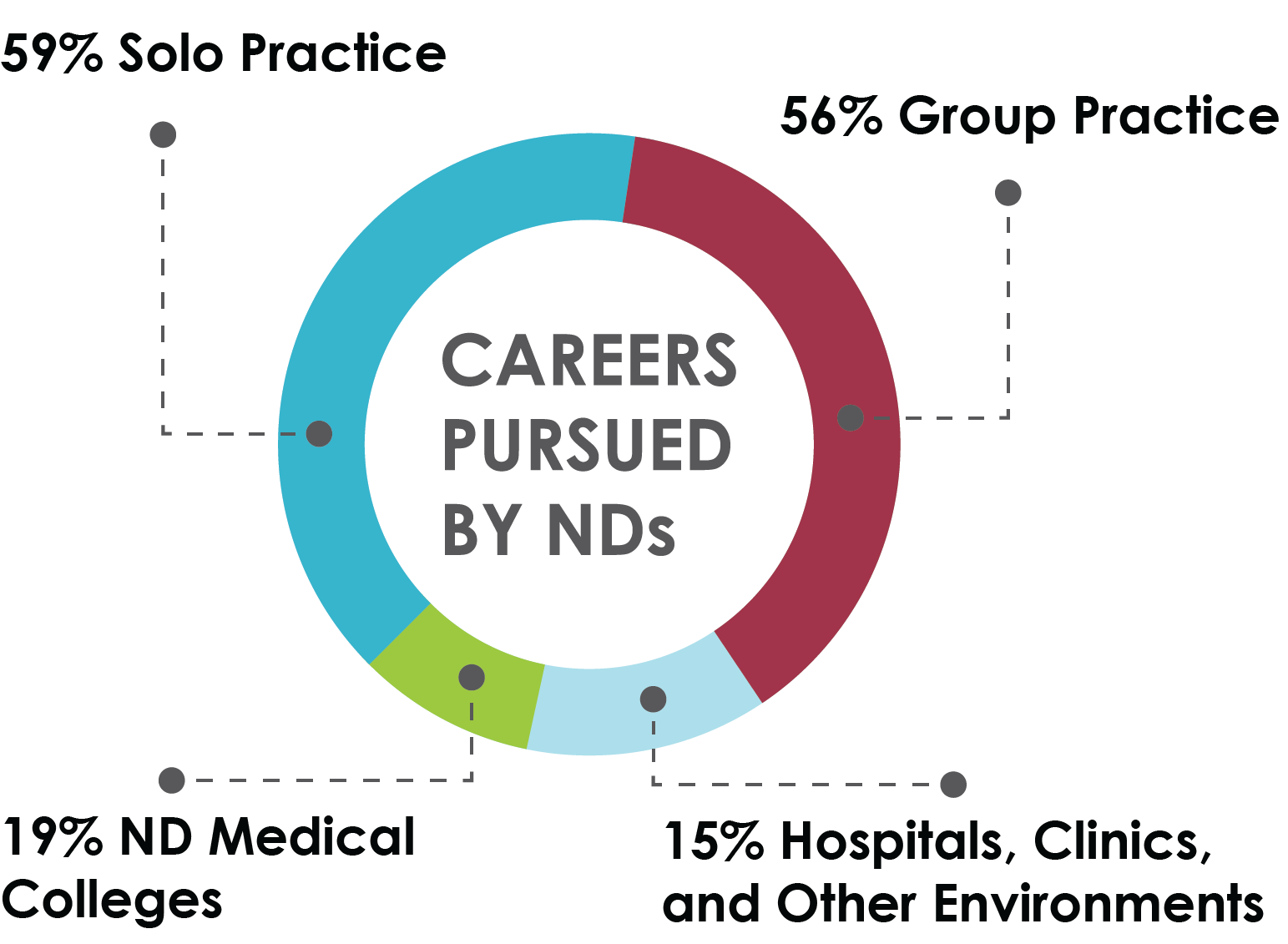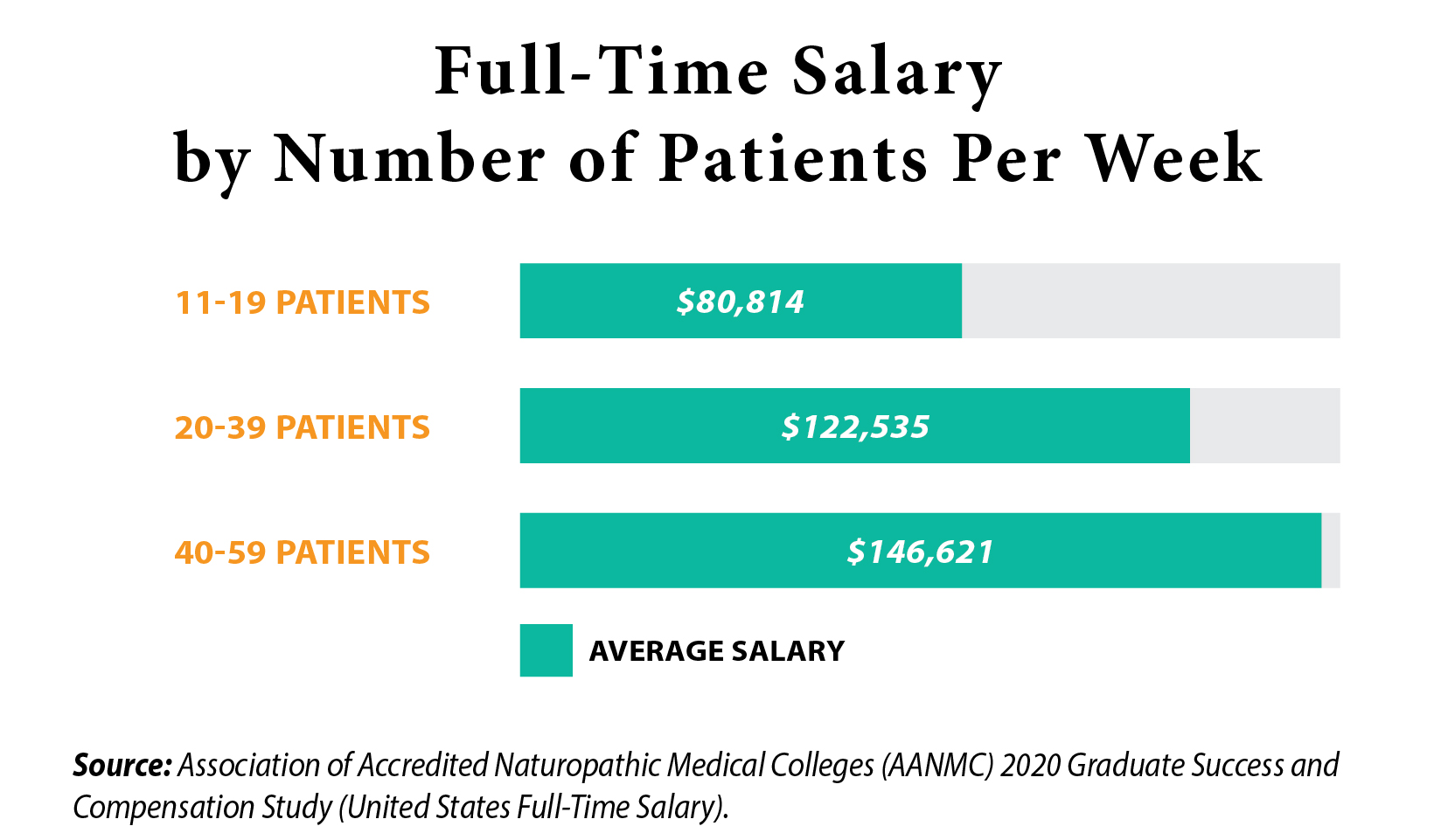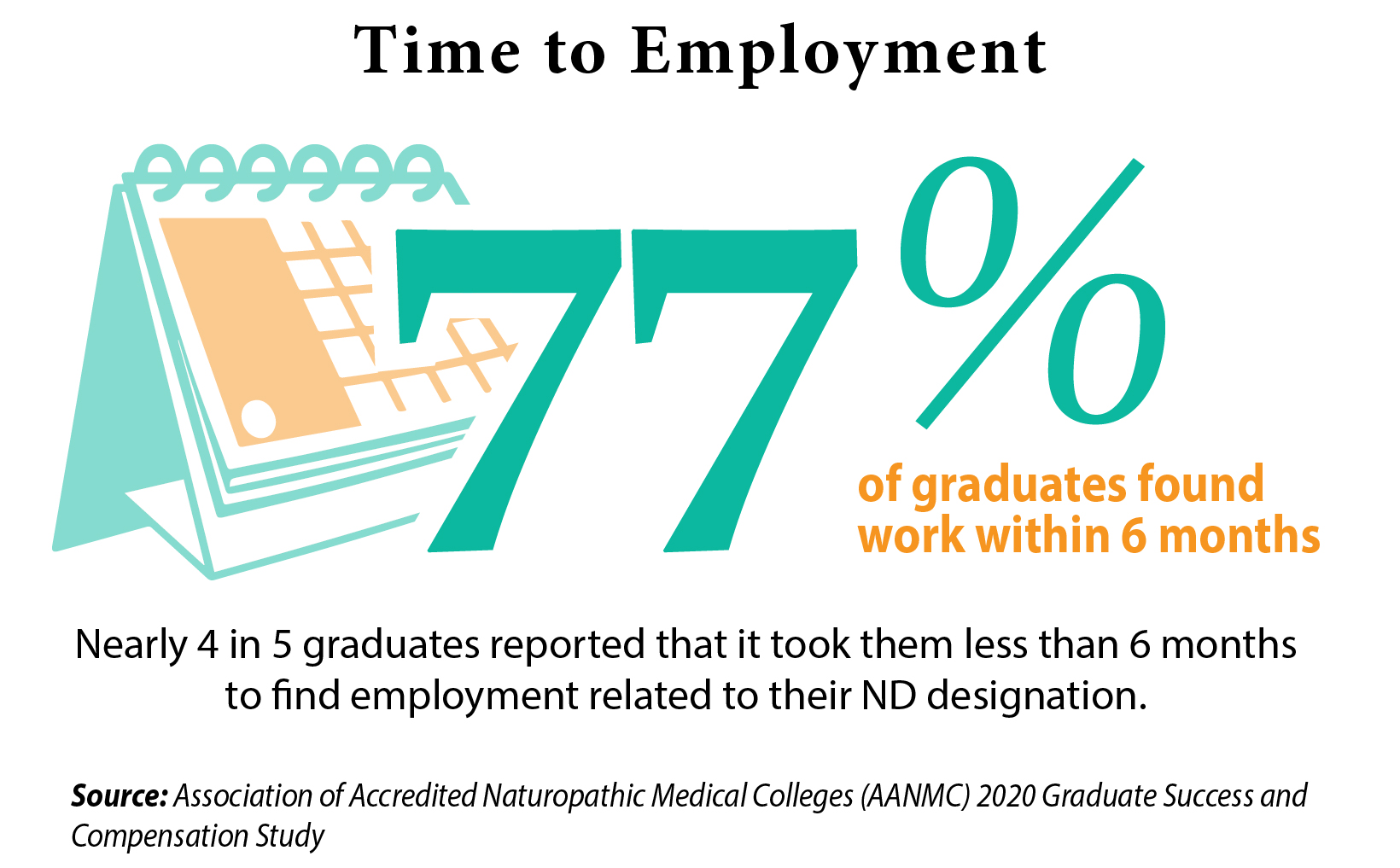A Career Guide to Becoming a Naturopathic Doctor
About This Page
This page, A Career Guide to Becoming a Naturopathic Doctor, is designed to help give an overview of the naturopathic industry to those considering pursuing a Doctor of Naturopathic Medicine (ND) degree. The admissions team here at National University of Health Sciences knows that aspiring naturopathic physicians have a lot to think and learn about before they decide if, when, and where to pursue their degree. We hope this page will bring you real insight into exploring an exciting career in naturopathic medicine.
Introduction to the field
What does a naturopathic physician actually do?
Naturopathic Physicians or Doctors of Naturopathic Medicine (NDs), like MDs, are trained as primary-care physicians who diagnose, treat, and prevent illnesses. They are highly trained diagnosticians and focus on the least invasive and least toxic therapies to address underlying causes of illness and to support the body’s own ability to ward off and combat disease. NDs address chronic health issues, such as diabetes, obesity, asthma, and heart disease, using modern medical science and natural therapies. Treatment modalities can include nutritional counseling, botanical medicine, homeopathy, hydrotherapy, and minor surgery. They practice personalized medicine and consider each patient’s unique situation based on genetics, environmental exposures, and lifestyle.

What are Naturopathic Physicians Able to do?
Naturopathic Physicians practice personalized medicine and consider each patient’s unique situation based on genetics, environmental exposures, and lifestyle. While naturopathic doctors are trained as primary care physicians, they also work with MDs, DOs, DCs, DAcs and other medical specialists, co-managing patient cases as part of an integrative medical team. NDs are able to:
Treat patients effectively with a wide variety of healing skills
Run their own business or work as an associate in a group or integrative practice
Specialize in fields such as women’s health, pediatrics, internal medicine, and more
Practice as a primary-care (first contact) physician in licensed states
Those seeking licensure as an ND must take national board examinations, as well as apply for licensure in the state where they plan to practice. The professional organizations representing naturopathic physicians include the Council on Naturopathic Medical Education (CNME) and the American Association of Naturopathic Physicians (AANP).
Career Outlook and Industry Statistics
The demand for alternative methods of health care is on the rise due to the increase in the prevalence of chronic disease coupled with an increased desire on the part of health-conscious Americans for alternatives to traditional Western medicine.
Nearly 4 in 10 Americans use some form of complementary and alternative medicine treatments (CAM), according to the U.S. Department of Health and Human Services.

Consumer demand for alternative health care will continue to grow according to The U.S. Department of Labor (DOL). The Department of Labor also forecasts that employment of physicians in general will grow faster than average for all occupations, driven in large part by the rapidly increasing older population.
With demand for this type of holistic care growing, there is certainly a need for more trained NDs. The demand for natural and non-invasive care means strong salaries and earning potential for naturopathic physicians.




Career Options for Naturopathic Doctors
ND graduates have a variety of different options after completing a degree, such as:
- Private practice – general or specialized practice
- Group practice or integrative clinic
- Hospital, specialty, or wellness institution
- University researcher, faculty, or administrator
5 Questions to Ask Before Selecting Your ND Program
Once you decide that you are interested in a career in naturopathic medicine, you’ll be faced with the task of choosing a program that will best prepare you to become a successful naturopathic physician. Not all ND programs are created equally. While most schools will give you training in naturopathic therapies, the caliber, depth, and rigor of the program can vary. Before selecting a school, start by asking important questions like the ones listed below:
Hidden Toggle
Does the school focus on integrative medicine and collaborative learning?
As more Americans seek natural and non-invasive treatments, more and more hospitals and specialty clinics now include integrative medicine programs that offer complementary and alternative medicine treatments. Look for a school that gives you experience in integrative medicine. This means a program where NDs train to work in cooperation with other health professionals, such as DCs, DOs, MDs, DAcs and other health care practitioners.
What we offer: National University offers a campus dedicated to integrative medicine and collaborative learning. You’ll study and work alongside students and faculty from its chiropractic medicine and acupuncture programs. In addition, the faculty of National University of Health Sciences includes MDs, giving students experience working collaboratively with allopathic physicians. This prepares you to understand and speak with a wider range of medical professionals when you graduate. You’ll be better able to establish strong referral networks with other health care practitioners and gain respect in the medical community. Most of all, you’ll be able to provide better advice and care for your future patients.
Is the school dedicated to the naturopathic philosophy?
Look for a school that not only teaches naturopathic principles and therapies, but is also dedicated to a curriculum grounded in the traditional naturopathic philosophy of treating the whole person. In other words, select a program that doesn’t just simply teach students to treat symptoms using naturopathic modalities, but rather one that teaches students to find the root causes of disease.
What we offer: National University trains students to focus on treating the individual rather than the disease and to look for underlying imbalances to determine naturopathic treatment modalities best suited for the patient. We encourage students to apply naturopathic principles in action and equip our students with models for case analysis and treatment by taking them further into naturopathic clinical theory. This comprehensive approach prepares our graduates to be exceptional diagnosticians and physicians.
Is the naturopathic medicine program accredited?
Accreditation is a very important factor in considering a naturopathic medicine school because a student must graduate from a school accredited by the Council on Naturopathic Medical Education (CNME) in order to sit for the licensure exams necessary for practice.
What we offer: National University has both regional as well as programmatic (CNME) accreditation for its naturopathic medicine program. This means when you graduate from our school, you will be qualified to take the NPLEX examinations required for licensure. National University is also a member of the Association of Accredited Naturopathic Medical Colleges (AANMC) which was established to propel and foster the naturopathic medical profession.
Which school offers the most beneficial opportunities for clinical training?
Geography: Look for a school located in a thriving health care job market which results in greater employment opportunities after graduation. This means hospitals, clinics, veterans’ facilities, science and health industries nearby, as well as convenient public transportation (airports, trains, buses).
Clinic Opportunities: Consider the clinical phase of the program. You should spend a full year treating actual patients under the supervision of clinical faculty, learning how to keep and read medical records, and gaining the confidence and skills to succeed when you start your own practice.
What we offer: National University offers its ND program in suburban Chicago, just a half hour from the city by train. You have a broad range of options as an intern from our university clinics to rotations in hospitals, veteran’s facilities, or community health clinics. During the final, clinical internship phase, ND students gain a wealth of clinical experience.
Which school supports your success?
Tutoring and Academic Support: Determine if the professors teach classes directly or use assistants. Ask if the school offers free peer tutoring (where senior students provide help in specific topics).
Business Classes: Discover what business classes are included in the curriculum. When you graduate, you’ll most likely be starting your own business, and you’ll also need to understand insurance, billing, marketing and business management procedures. Be sure the school you pick offers classes that give you these skills.
Additional Education: Does the institution offer an opportunity to enroll in dual-degrees or multiple programs so that you can earn more credentials with less time and money?
Strong Alumni Network: Look for a school where alumni are involved, communicate with each other and current students, and where you can reach out to them for mentoring and career support.
What we offer: National University offers an array of student support services that contribute to a successful educational experience. These include academic advising, peer tutoring, flexible tracks, various student clubs and more. Business classes designed to help you build, market, and manage your practice are included in the curriculum, often with industry experts as guest speakers.
Navigating the Admissions Process
Another very important element that comes with deciding to go to naturopathic school is knowing how to navigate your way through the admissions process. You need to be sure you understand the requirements for acceptance, what documents you will need, deadlines for application elements, and ways to make yourself an attractive prospect. You should start by asking important questions like the ones listed below:
What undergraduate degree is required?
A science major such as biology or chemistry is the best preparation, since naturopathic schools require you to have completed a certain amount of science credits, including laboratory sciences.
However, you don’t need to worry if you don’t have a science major. You can complete necessary science prerequisites prior to admission.
In fact, National University offers a wide selection of undergraduate science courses right on campus in our prerequisites program. So, you can begin at National University in that program if you need to complete mission science coursework.
What will make me a more competitive applicant?
You can demonstrate this by having a “shadow experience” – spending time in a naturopathic physician’s office in order to understand if this is the right career for you. National University offers “shadow experiences” before or after you apply with a network of practicing graduates.
It is also important to select undergraduate classes that will make you more prepared when you begin your advanced degree. Review our suggested course outlines to understand the courses you should be taking at your undergraduate institution that will satisfy our prerequisite requirements.
What will make me a more competitive applicant?
Even if you think you don’t have everything needed to apply to a naturopathic school, call an admissions counselor to consider your options. They may be able to help!
Most naturopathic schools will require the following documents:
- Application for admission
- Application fee and deposit
- Essay question responses
- Character references
- Undergraduate transcripts
- Completion of an interview
NOTE: Most naturopathic schools will not require the following:
- Standardized tests (e.g. MCAT, GRE)
Download the Guide Today!
If you’re passionate about pursuing a future in naturopathic medicine we invite you to download our resource—A Career Guide to Becoming a Naturopathic Doctor.
National University of Health Sciences Naturopathic Program
National University prepares students to become first-contact, primary-care physicians fully qualified to diagnose, treat, and manage a wide range of conditions. We believe a superior education starts with an evidence-based, broad-scope curriculum emphasizing integrative medicine.
Our Academic Superiority
National University’s academic programs are rigorous, uncompromising, and built on a solid foundation in the basic sciences. We maintain high admission standards for our students. As a result, the student body at National University is of a higher academic caliber. National University graduates often become leaders in their professions and credit the school as the reason for their confidence and success.

Our Dedication to Integrative Medicine
National University prepares graduates for the future of health care by offering a campus dedicated to integrative medicine. In fact, you’ll study and work side-by-side with students and faculty from its chiropractic medicine and acupuncture programs. As a result, you will be better prepared to work and thrive in today’s integrated health care market.
Our Focus on Naturopathic Philosophy
The Naturopathic Medicine program at National University emphasizes the teaching and application of the principles of naturopathic philosophy and clinical theory, not simply naturopathic therapies or modalities. We train students to focus on whole-health healing and to treat the individual rather than the disease. This comprehensive approach prepares our graduates to be exceptional diagnosticians and physicians.
Next Steps
The team at National University hopes that this page was helpful in providing you information about the naturopathic industry and how to successfully begin you journey toward a Doctor of Naturopathic Medicine degree.
Please do not hesitate to reach out to us if you have any questions about our programs or the student experience.
You can give us a call at the Office of Admissions 1-800-826-6285 or email us at [email protected].

Learn More About our Naturopathic Program From our Students
Alison Egeland
“Most of the faculty here at NUHS…are doctors, and many of them also have their own practices and see patients. So, you’re getting a world of experience….”
Takiyah Smith
“This is a form of medicine I really want to get involved with. It doesn’t treat the body as separate parts, but considers the whole person and is based in prevention and wellness.”
Featured Naturopathic Blog Posts
We invite you to check out a few of our most recent naturopathic blog posts to help you stay in-the-know on all things naturopathic medicine.
On Problem Solving
Seeking to understand the human experience is a worthwhile pursuit for anyone, especially a future healer. Recently I have been thinking about a concept put forth by…
Love is Patient
The Harvard Study of Adult Development found that best predictor of a long life – above social class, IQ and even genes – is the presence of strong social ties and close relationships…
On Relationship
This week I will share an excerpt that I enjoyed reading from Jordan Peterson on the topic of relationship. We all have a deep need…



